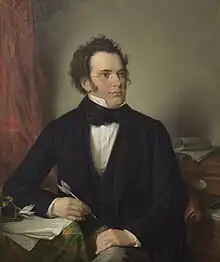Lazarus (Schubert)
Lazarus or Die Feier der Auferstehung, D 689, is an unfinished 1820 oratorio by Franz Schubert on a libretto by August Hermann Niemeyer. Intended to be in three acts, only act 1 with twenty-one numbers, and eight numbers from act 2 are extant.[1]
Structure
The work is for three sopranos, two tenors, bass, mixed choir and orchestra.
Act 1
- Introduktion
- Hier laßt mich ruhn die letzte Stunde
- Noch einen Augenblick?
- Trübe nicht mit Klagen seine Seele
- Steh' im letzten Kampf dem Müden
- Voll Friede, ja, voll Fried' ist die Seele
- Kalter Schweiß rinnt von der Stirn
- Willkommen, mein Nathanael
- Wenn ich ihm nachgerungen habe
- Nathanael, bewundern kann ich dich
- O Martha, o Martha, bliebst du stiller
- Der Trost begleite dich hinüber
- Wenn nun mit tausendfachen Qualen
- Gottes Liebe, du bist deine Zuversicht
- In der Leiden bängster Nacht
- Ach, so find' ich ihn noch
- Jemina, Tochter der Auferstehung
- So schlummert auf Rosen
- Nun entflog auf schnellen Schwingen
- So war mir, Lazarus
- O Barmherziger, o verlass ihn nicht
Act 2
- Introduktion
- Wo bin ich?
- Schon bereitet ihr Gräber
- Wess ist der Klage Stimme
- So weile hier, mein Freund
- Sanft und still
- So legt ihn in die Blumen
- Wecke sie nicht
Roles
- Maria (soprano)
- Martha (soprano)
- Jemina (soprano)
- Lazarus (tenor)
- Nathanael (tenor)
- Ein Jüngling (tenor)
- Simon Peter (bass)
Recordings
- 1978 – Carola Nossek, Ursula Reinhardt-Kiss, Ingeborg Springer, Eberhard Büchner, Horit Gebhardt. Staatskapelle Berlin Dietrich Knothe recorded in the Christuskirche, Berlin Berlin Classics 94452BC; reissued 1 CD Brilliant Classics
- 1981 – (also Mass No. 2 in G, D 167), Theodor Guschlbauer[2] Warner Apex 2008
- 1983 – Edith Mathis, Wulkopf, Schwarz, Hollweg, Laubenthal, Hermann Prey conducted Gabriel Chmura, Orfeo 2LP
- 1983 - Lucia Popp, Robert Tear, Helen Donath, Maria Venuti, Josef Protschka, Dietrich Fischer-Dieskau, Chor Des Bayerischen Rundfunks, Symphonie-Orchester Des Bayerischen Rundfunks, Wolfgang Sawallisch, EMI Classics
- 1996 – completed by Edison Denisov. Rubens, Nylund, Nold, Weir. Bach Collegium Stuttgart, Helmuth Rilling Hanssler 1996,[3] also reissued 2 CD Brilliant Classics 99969[4]
- 1997 – Concentus Musicus Wien, Dorothea Röschmann, soprano; Ľuba Orgonášová, soprano; Elisabeth von Magnus, mezzo-soprano; Herbert Lippert, tenor; Reinaldo Macias, tenor; Raimund Nolte, baritone. Arnold Schoenberg Choir, conductor Nikolaus Harnoncourt Classics
- 2013 – Sarah Wegener, Johanna Winkel, Sophie Harmsen, Andreas Weller, Kammerchor Stuttgart, Hofkapelle Stuttgart, Frieder Bernius 1CD Carus
References
- Maurice J. E. Brown. 'Lazarus, or The Feast of Resurrection', in Essays on Schubert (1966), pp. 101-124
- The Gramophone – Volume 59, Issue 1, 1981: "Lazarus is an incomplete work by Schubert and Theodor Guschlbauer has recorded the work precisely as Schubert left it, ending at the very point where the master laid down his pen. A work of immense importance and content"
- Classic CD. 1996 – Issues 75–80 p. 165: "It was Rilling who instigated the completion of Schubert's Lazarus. And in doing so, Denisov has erected a new edifice without destroying the foundation. He develops Schubert's ideas leading to a contemporary, satisfying completion."
- Lazarus, Brilliant Classics 99969
Sources
External links
- Lazarus, D 689: Scores at the International Music Score Library Project
This article is issued from Wikipedia. The text is licensed under Creative Commons - Attribution - Sharealike. Additional terms may apply for the media files.
